Uprising: Overwatch PVE
In a not-quite-surprising but also quite-suprising move, the Overwatch team has introduced a PVE mode called ‘Uprising’ for the latest limited time patch. It’s not-surprising because they’ve done it before (with ‘Junkenstein’s Revenge’), but what is surprising is how they’ve suddenly made an Overwatch PVE game - dare we say an Overwatch MMO1 - seem possible.
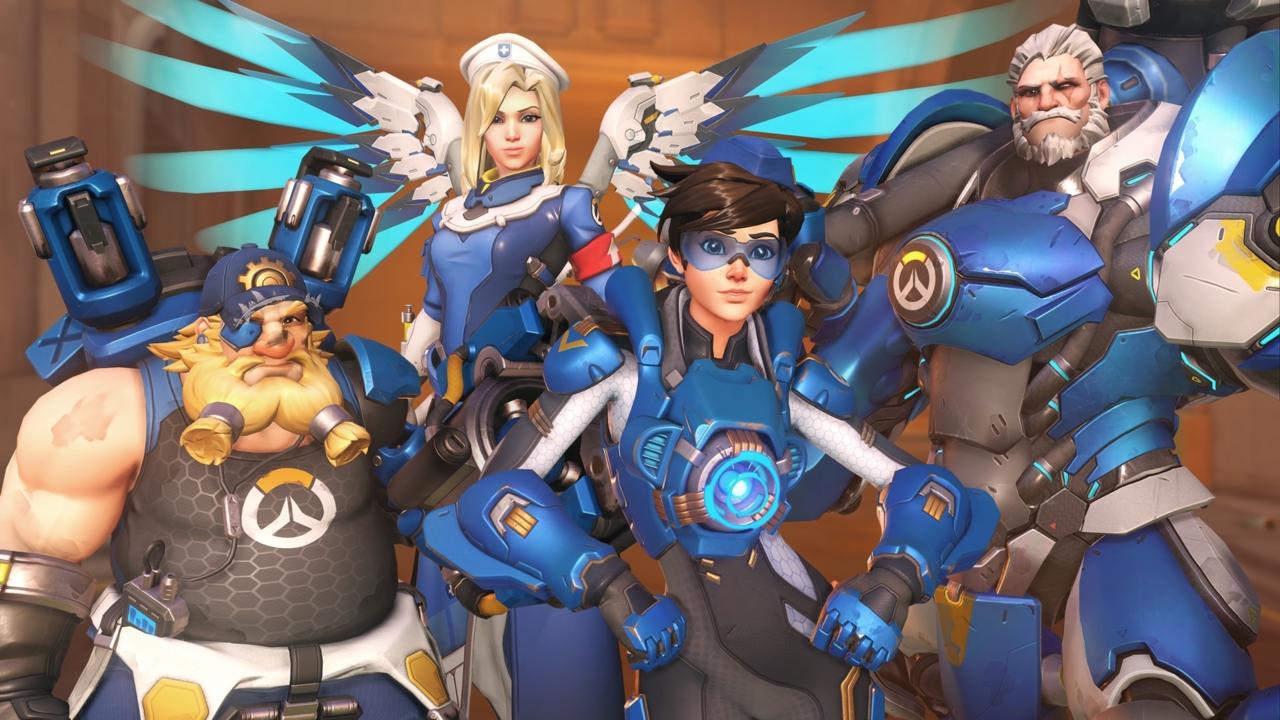
Reinhardt and Torb were grizzled from birth
Uprising is basically an MMO dungeon, rendered in the high-pace high-colour Overwatch universe. If you’ve ever played an MMO you’ll instantly be at home: there’s mini-bosses, routes, timers, tactics, and hard-modes. It even introduces and demands the (accursed?) trinity - tank/healer/DPS - to the game. It’s a nice change of pace to the more chaotic PVP play and has been extremely well received.
Funnily enough it also introduces some of the same problems MMO dungeons have. The first time I played it was several days after launch, and by then it seemed like most players already knew exactly what routes to take, what shortcuts, where the trash would spawn, and when to burn cooldowns. So coming in cold was instantly difficult as the expectation was go-go-go, the bane of MMO dungeon running if you prefer a more measured approach. Being Blizzard they were obviously expecting this, and have countered it a little by making four difficulty modes similar to the Normal/Heroic/Mythic steps in Warcraft et al, including a final ‘Legendary’ mode that has even hardcore players struggling.
Even the first step up from Easy to Hard mode makes it clear that the go-go-go approach won’t work for long, and that a little caution and communication is required.
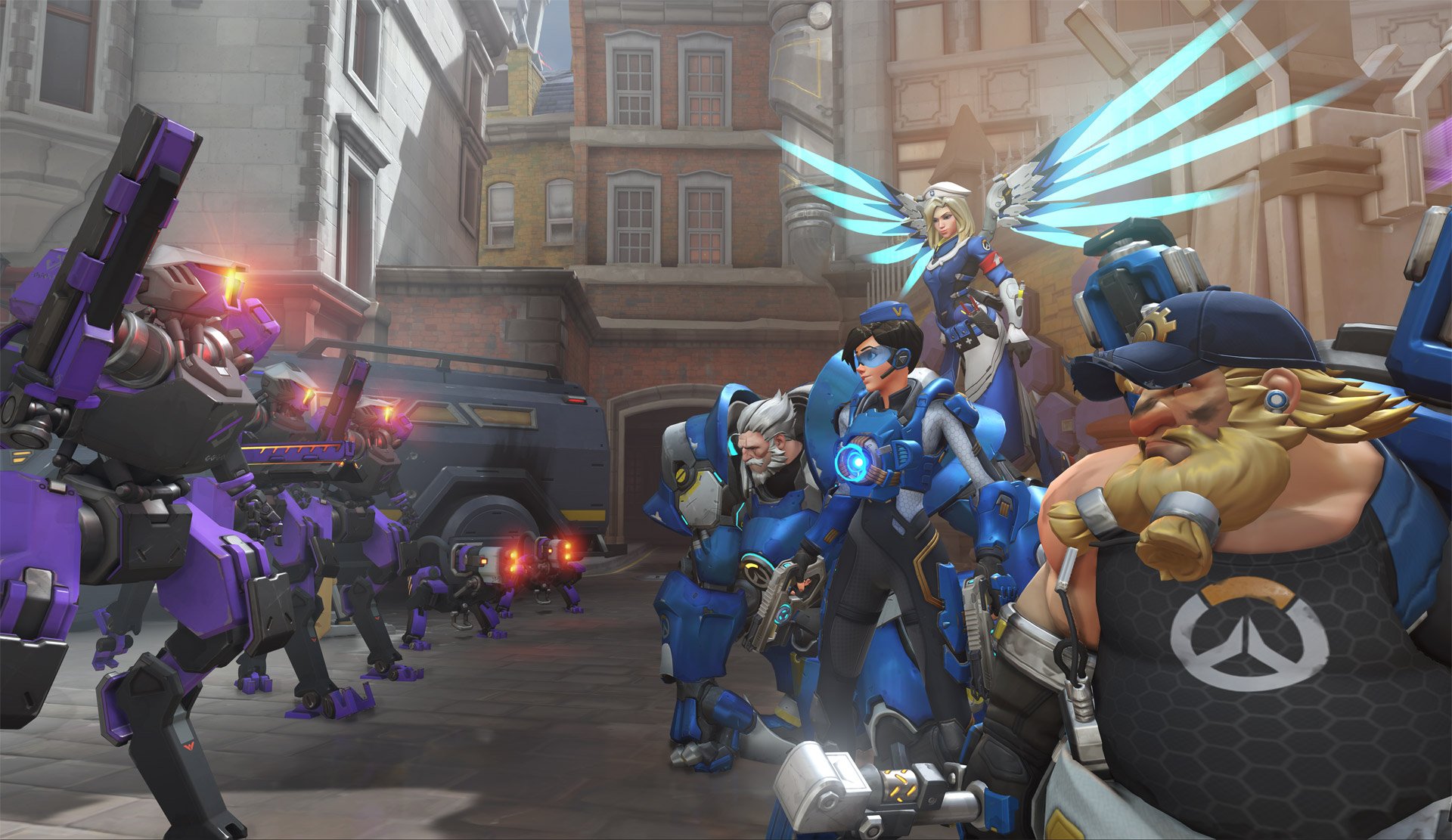
Purple people eaters
Which is all very smart stuff if you’re preparing/training/testing your player base to see how a PVE game might work. Jeff Kaplan has hinted at more games in recent interviews, including this quote buried in an article about Overwatch character diversity on Polygon:
We think of Overwatch as being beyond the 6v6 shooter. We think of it as a universe we hope to build many games in some day.
Of course he would say that, and it’s also fairly flimsy ‘evidence’2, but there is obviously the possibility that Titan will raise phoenix-like from the incredible success of Overwatch. Which would make for an amazing story in itself given that title’s fraught history.
In Reinhardt’s words, bring it on.
Overwatch positivity
In between tackling bigger games I’m still dabbling in Overwatch, and have recently stumbled upon some good resources for learning more about playing better.
First, and maybe surprisingly given it’s rep, there’s a pretty good Reddit group called Overwatch University. The name says it all, but one of the nice things seems to be the encouragement of positive feedback to even simple questions.
The second, and best, is a YouTube channel run by Skyline. This is a great resource full of educational stuff about heroes, maps, strategies, etc. Skyline is an extremely good communicator and teacher, but most of all he’s also pushing the positivity barrow. When he’s analysing VODs submitted by players, he takes a good humoured and encouraging line on everything he talks about, no matter how un-optimal some of the submissions are. It’s super refreshing - his ‘highlighted’ video is basically a recommendation that ‘having fun’ is the best way to get better. Wise words for any game.
Finally there was a good spontaneous Reddit AMA from Overwatch boss Jeff Kaplan, who has emerged as the Ghostcrawler of the OW team. He’s very open, communicates often, and the AMA is a good example of why the game maintains popularity despite nerfs, buffs, and loot box controversy. Plus, you learn excellent facts like:
The first hero we implemented was Tracer. We did not have any animations or gun models. So she shot laser beams from her eyes.
LASER BEAM EYE TRACER. YES!
Witcher 2: Choose their own adventure
After enjoying Dishonored, I felt like getting into a deep swords & sorcery type of game, and The Witcher 2 seemed the logical choice. Settling back into Geralt’s scarred and complex character was like pulling on a comfy t-shirt.
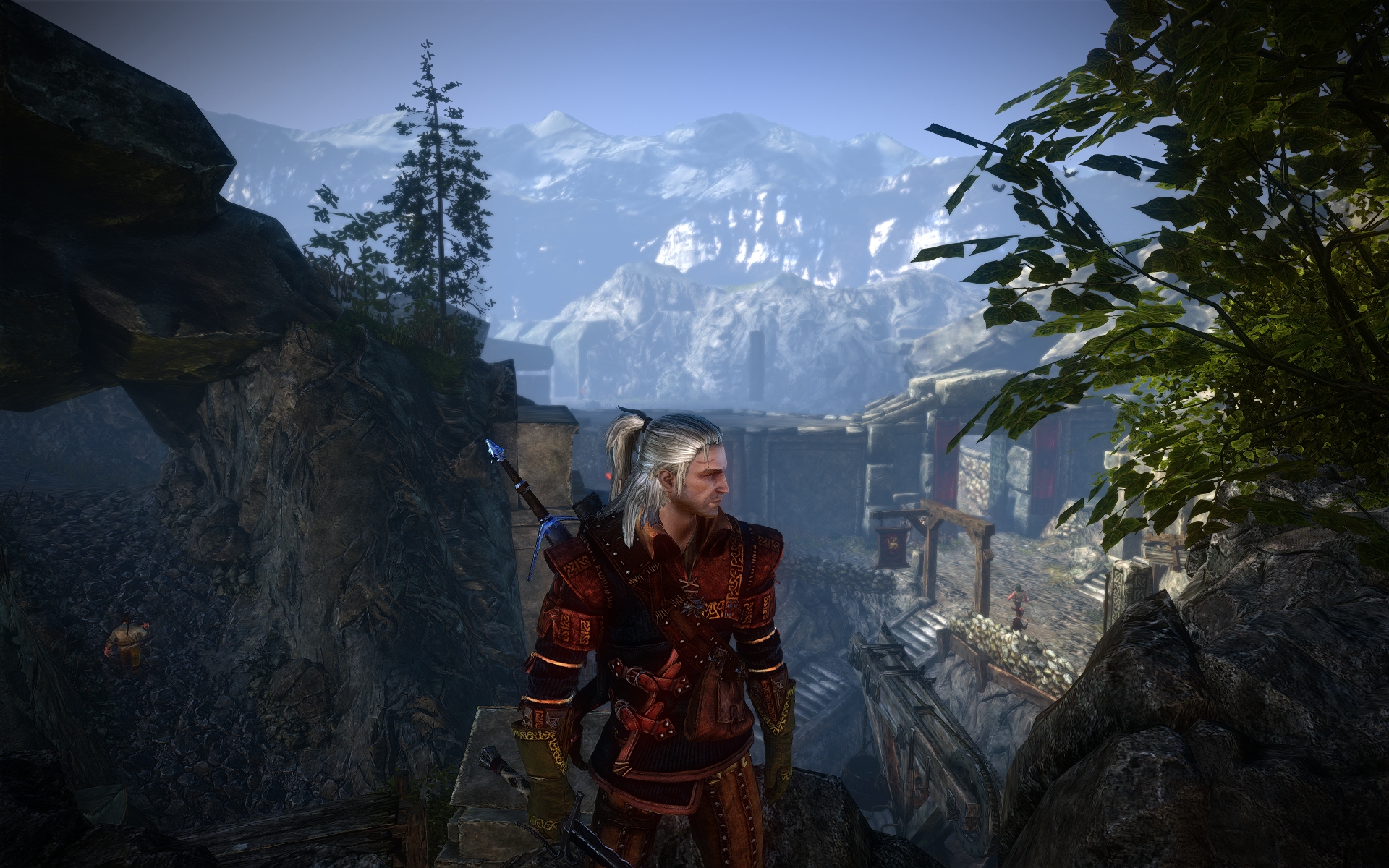
Handsome
It’s a true epic1 of a game and story, and incredibly impressive. From the opening sequences where you find yourself in the midst of a full scale castle siege, to Dwarven citadels, Elven high citadels, and everything in between, the game oozes scale. As with Witcher 1, the story is well told, the main plot of politics and magic unfurled and intertwined with as many or few side quests as you’d like to partake. There are a lot of long static dialogue scenes, which can be a bit tiresome, but once you sink into the storytelling method it captivates - and you end up choosing every last bit of the dialogue trees on offer in order to flesh out the world and populace.
Most impressive of all are the hugely important narrative choices you can make. At the end of the first act, there is a choice between supporting two factions, and the entire second act is different depending on which choice you make. In other words you could play a quite different game based on one major decision. The developers have effectively created two games in one, not afraid to know that the audience will probably miss out on a huge chunk of content as a result.
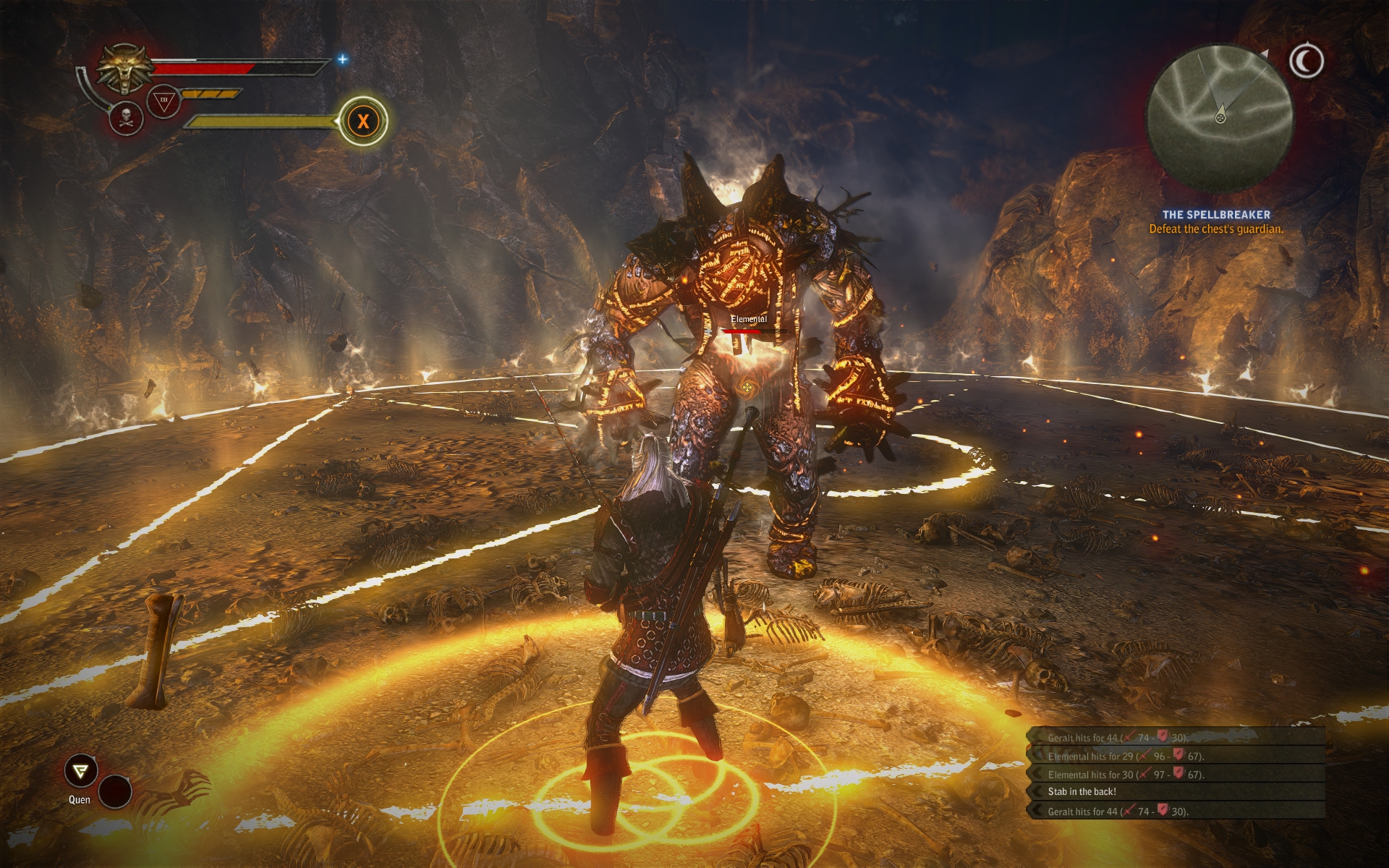
The game world seems better planned than the first game, with less running to and fro delivering herbs. After Dishonored it was a bit jarring to suddenly find you couldn’t just jump off castle battlements, instead having to follow the developers rails, but you quickly adjust to the game’s intentions and mechanics. Character development is improved from the first game, and you can choose quite different play styles based on your preferences.
I went deep into swords, basically ignoring the magic and potion based gameplay. Playing on easy mode made that possible, I suspect any of the more difficult modes would require a more balanced approach. By the end of the game I was weaving impenetrable webs of steel with glee, which was fortunate given the challenges some of the boss fights presented.
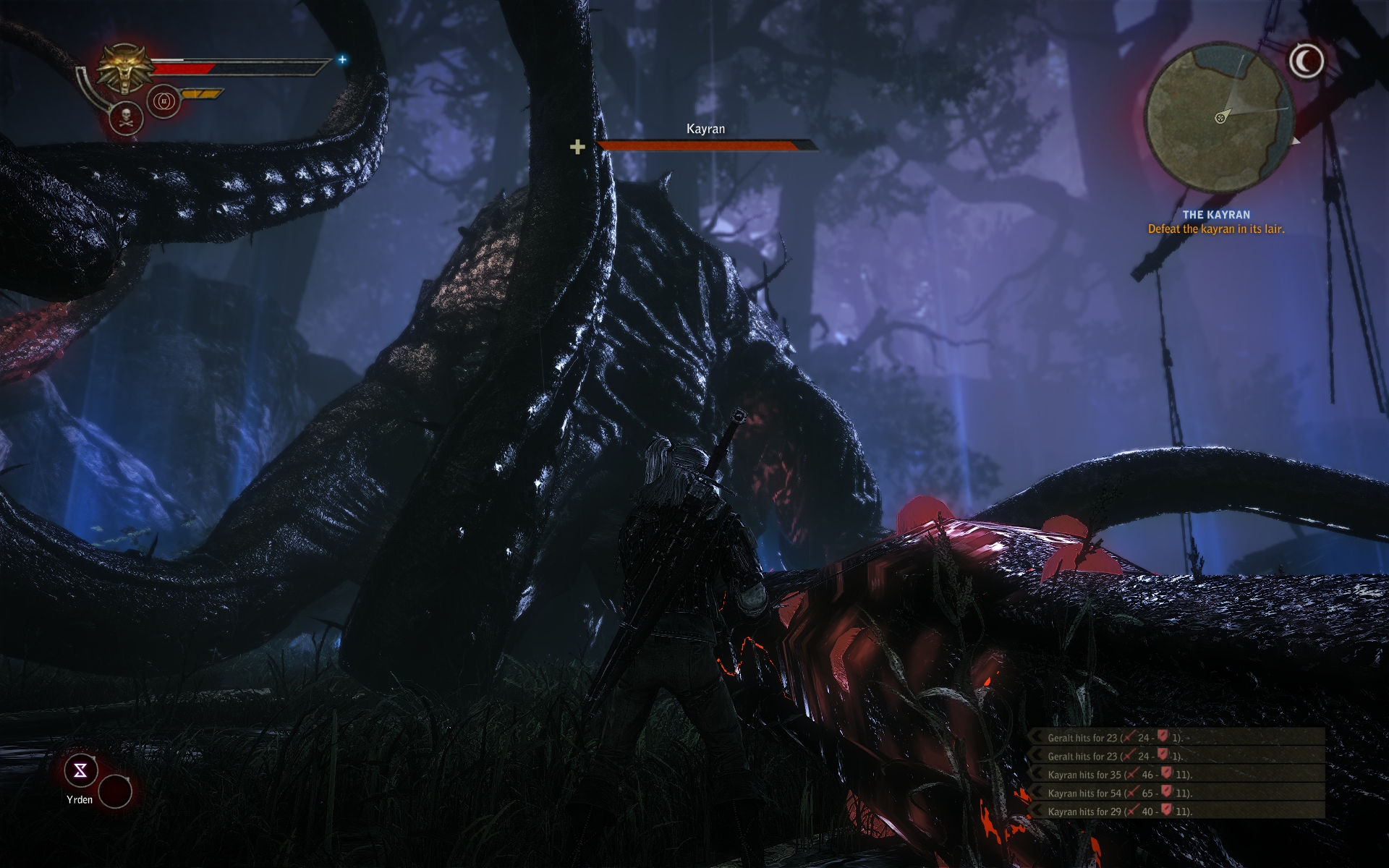
The dialogue and characterisation is top notch, and, like Witcher 1, the European sensibility results in an adult and decidedly non-cliched approach to storytelling. Characters act and behave as real personalities, rather than storyboard plot devices. The Dwarves are a particular highlight, boisterous and tough as old boots, with lovely Scottish accents to match. And the trolls - genius.
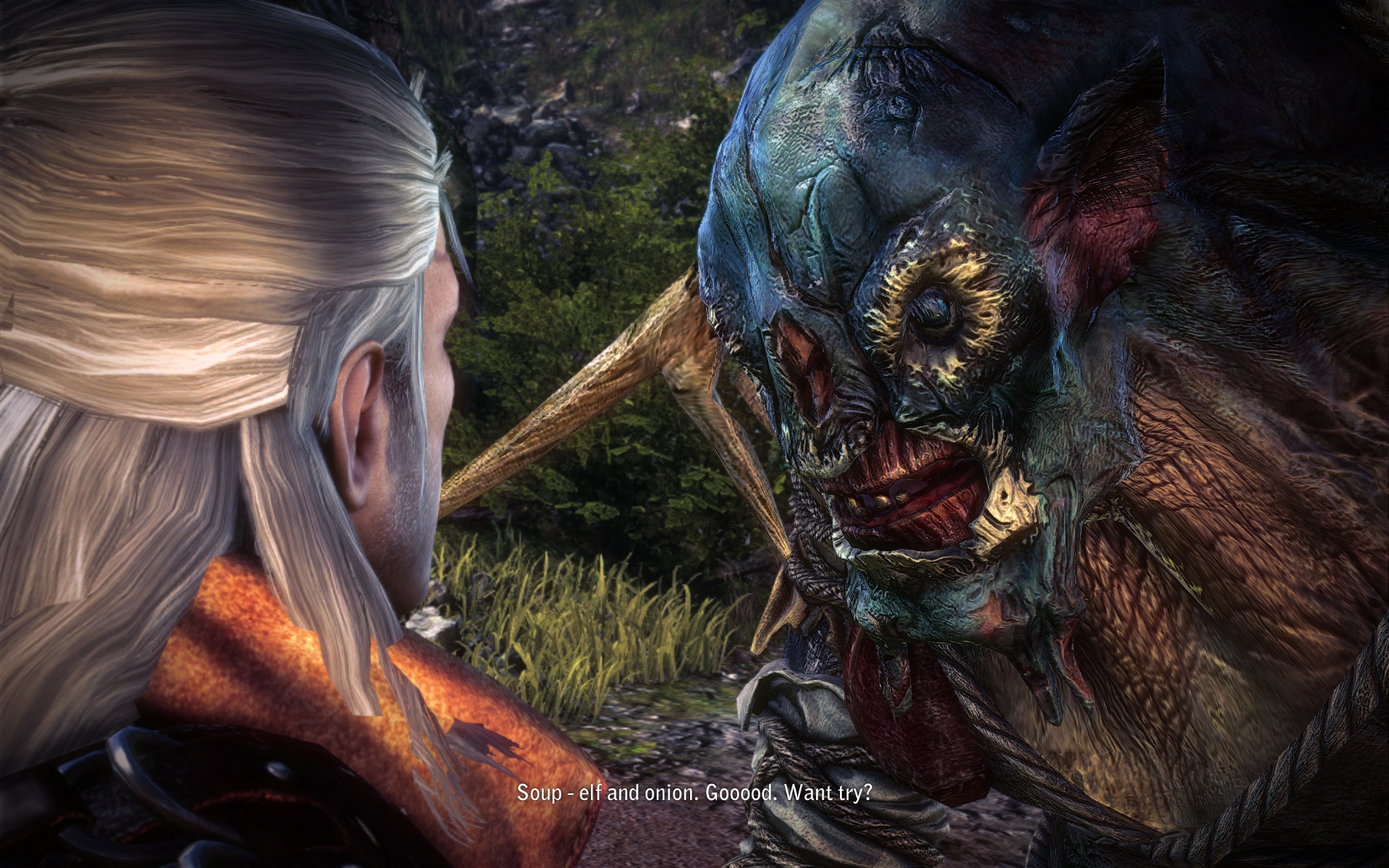
Trolling
Another nice touch is the save game import from the first game2, which impacts starting gear and some (minor) storytelling during this game. Obviously the same thing will apply to Witcher 3, which again will be swayed by some major story choices that are available late in the game. I played through two different endings and was quite amazed by the startlingly different results of the choices made.
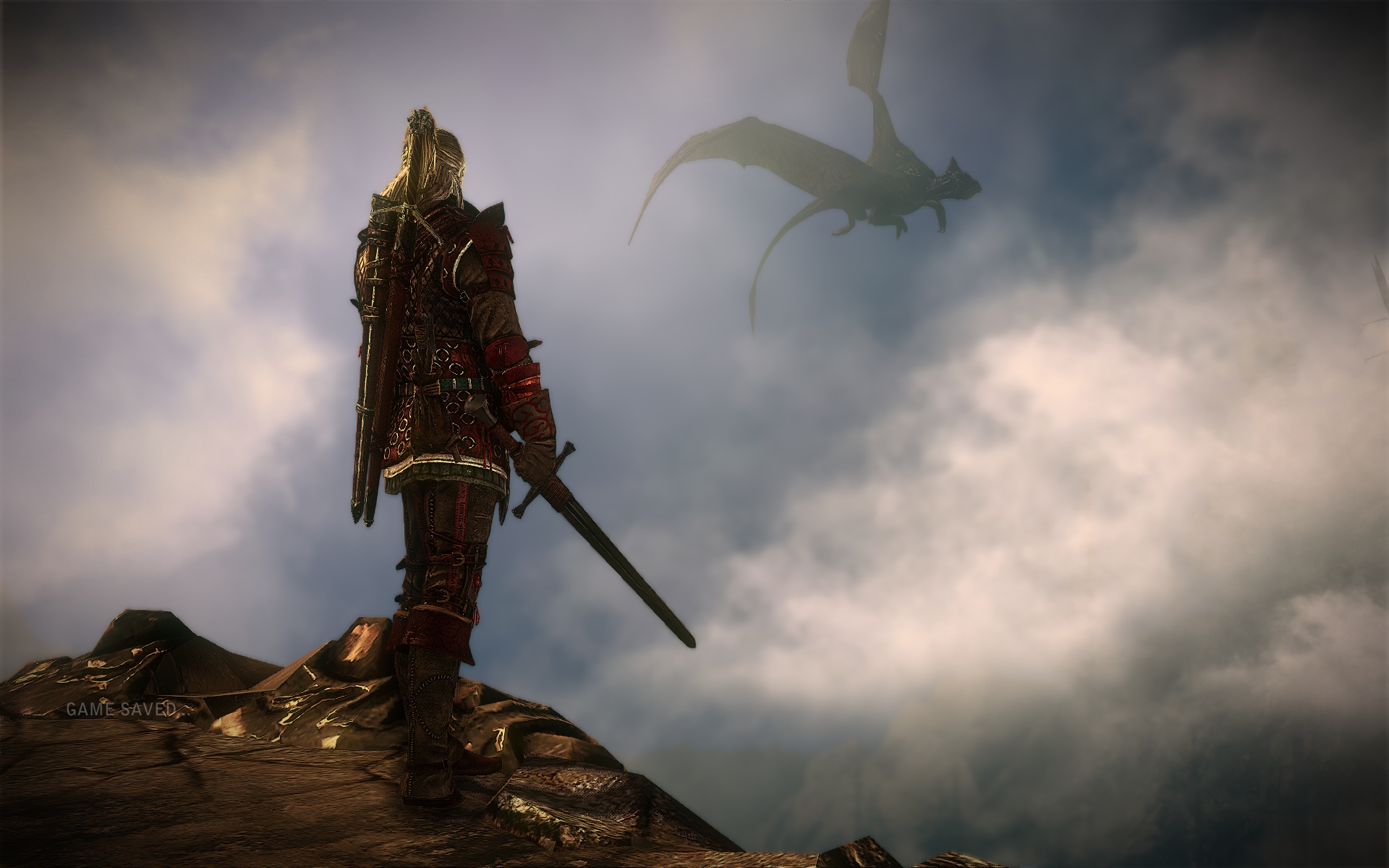
I’d guestimate it took about 35-45 hours to play through, entirely worthwhile if you’re looking for a fantasy world you can sink your teeth into. I’m a little scared to start on Witcher 3 with it’s 100+ hours, but it’s definitely in the queue now.
Dishonored: choose your own adventure
I remember seeing adverts for Dishonored plastered all over busses driving around Sydney when it was released back in 2012. Another generic shooter I figured, ignoring it at the time. But I also remember seeing some pretty glowing reviews, and the release of DH2 to similar fanfare made playing the first game seem like a good idea. Plus a friend was keen for a playthrough - just the motivation required. And I’m super glad we did - Dishonored is an excellent first person adventure, leaving the well trodden path of the shooter to deliver something far more entertaining.
The keys to it’s success were the fact that you can choose entirely different methods of playing, and that the levels and zones have a refreshing non-linear nature and great freedom of movement.
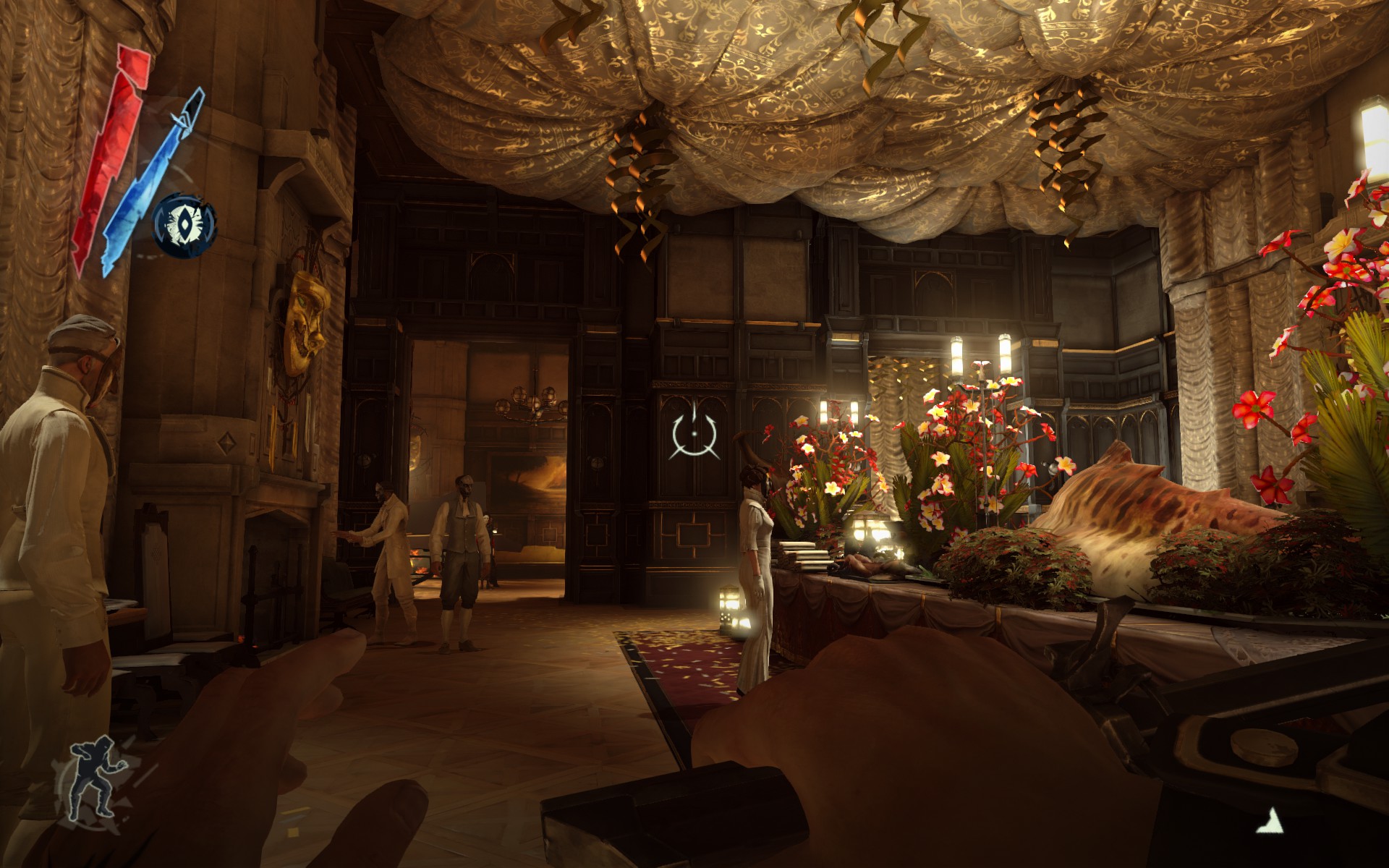
Set in a steampunkian world that resembles Bioshock Infinite to a degree, you are tasked with clearing your name (hence: Dishonored1) after an assassination. So far so predictable, but once you start your quest the game delivers in delightful fashion.
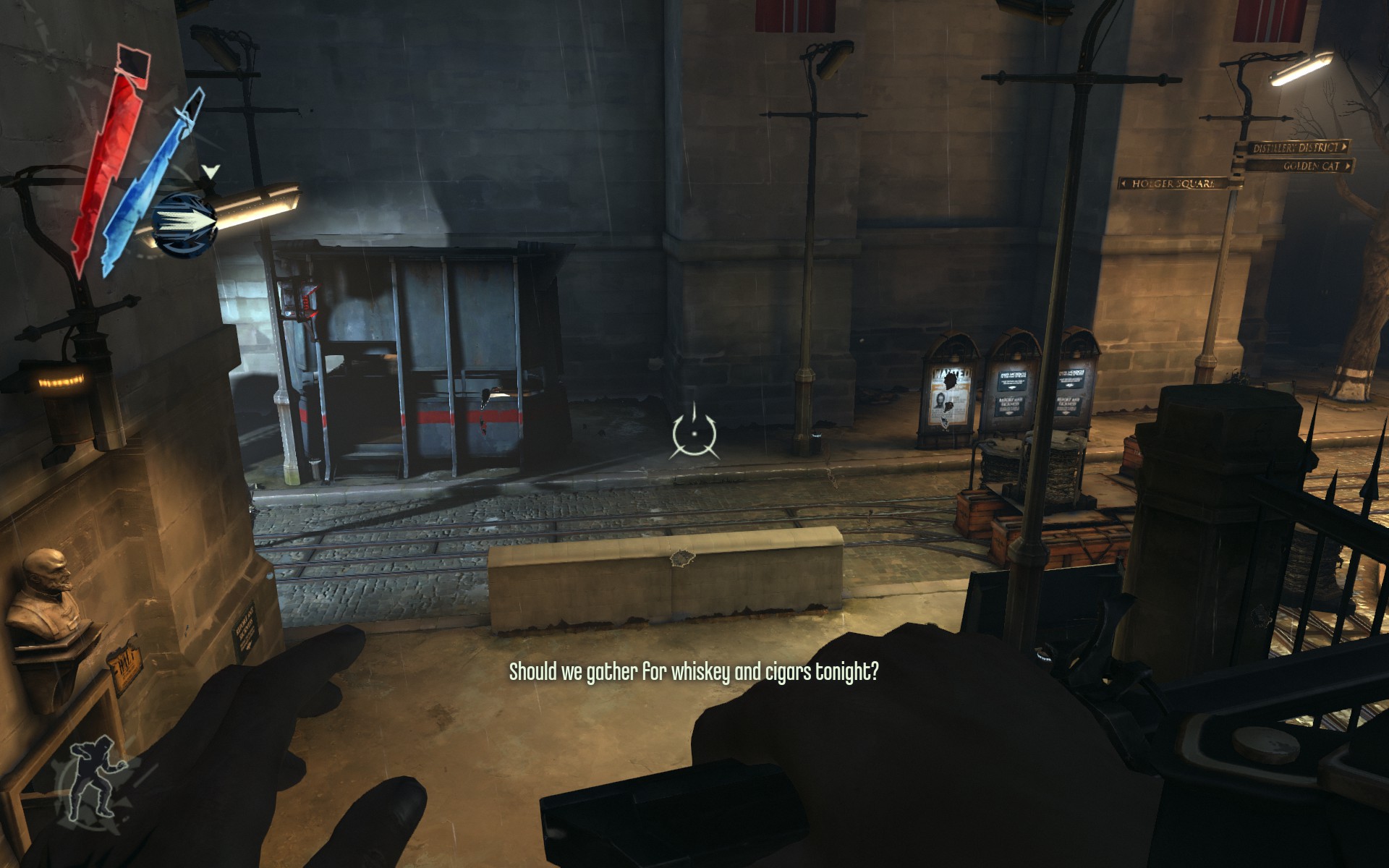
Never doubt it
You can approach the game as a run-and-gun shooter, blasting your way through everything, or as a stealth-based Thief-a-like. Compellingly, the choice you make impacts how the world reacts around you from level to level. Too much chaos and the guards are more alert. Too much death and the plague rats become more vicious. I snuck through the entire game virtually undetected using the invaluable x-ray vision - with copious reloads to do so - but the alternate approach is just as viable.
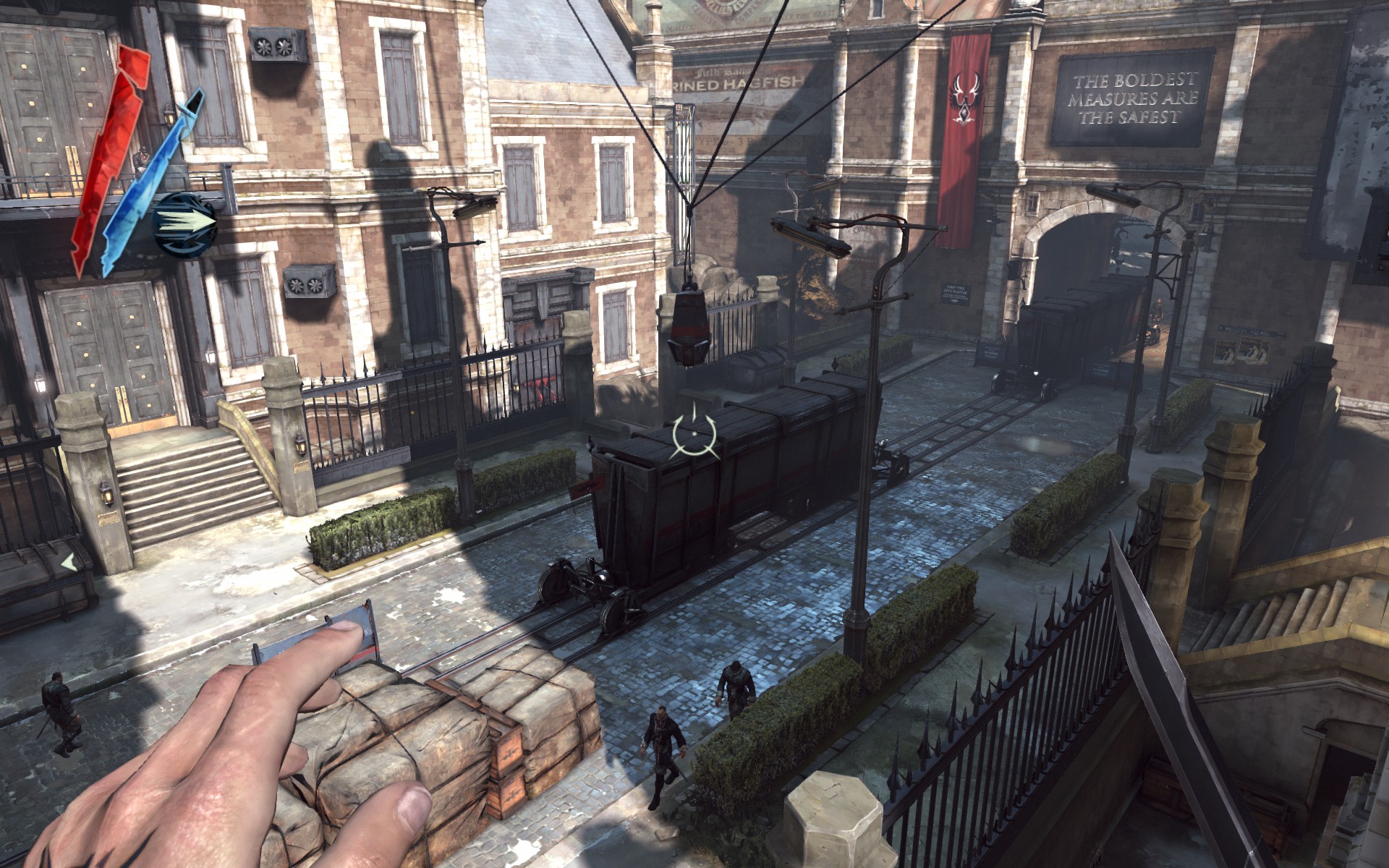
The level design is great, and the early introduction of a Nightcrawler-esque short distance teleport bampf suddenly opens up the game world to vertical and horizontal solutions. You can traverse the streets at great heights along balconies and rooftops, or scuttle through sewers and drains whilst possessing rats. The freedom of movement is very refreshing - trying other games after playing DH brings home the disappointment of not being able to go almost wherever you wish (looking at you Alien: Isolation - ‘no you can’t jump over that tiny wall or move through that obvious gap’).
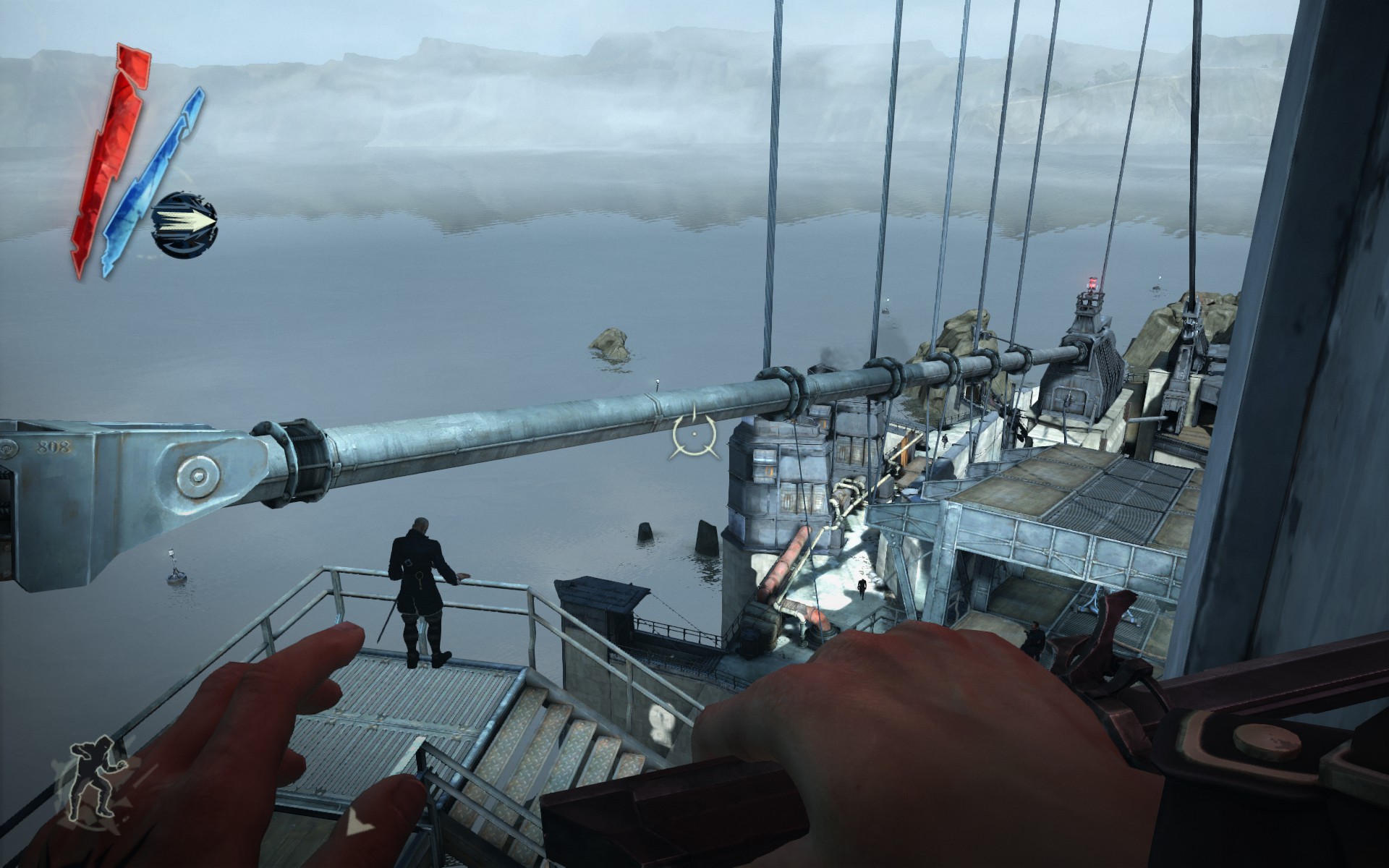
There are optional goals for each level to satisfy replayability, objects and runes to discover to empower your skills, and the plot is satisfyingly political and mostly sensible (unlike the aforementioned Bioshock Infinite, which whilst fun had a nigh on impossible plot to unravel). DH also throws you straight into the main story, and keeps you there, which means it’s refreshingly short too - probably around 20-30 hours. Definitely recommended. Looking forward to DH2, maybe when the DH3 bus ads start appearing.
-
Ugh leaving out the ‘u’ is difficult. ↩︎
Wherefore Warcraft
Back in September 2016 I posted about being stalled in Warcraft. Five months later nothing has changed.
I’ve maintained my subscription, but have only logged on to idle about, stare at my character stable, get momentarily enthusiastic about one, then logout shortly after. As I covered in that earlier post, this is something that happens after every new expansion and I’ve been trying to work out why. This time it was particularly galling as I’d found a great guild (after the gradual disintegration of my own during the appropriately-named Cataclysm).
Reading the adventures of Frostwolves through each patch makes it clear how welcoming and encouraging they are, even through some very hard personal times recently. And I’ve missed out on being a part of that, through my own bizarre reluctance to play. After some thought I think it comes down to a few different things.
One is the feeling of pressure to level and equip that occurs with each expansion drop. Logging on after a few days and seeing people already at max level and working on gear and rep leaves me feeling like I’m underperforming and lagging behind almost immediately. I like the idea of being on an even keel with other raiders, which is what an expansion should allow, but due to my slowness getting started I’ve always ended up behind before even getting going. I know the guild wouldn’t judge or mind or even notice at all, but it’s a mental block for me. So I drop behind quickly, and then start feeling like it’s impossible to catch up. Which leads to not logging on, or creating low level alts and getting that quick hit of levels and skills - and getting even further behind.
Another is that an expansion makes the gear/rep timesink somehow more transparent. Rushing through the levelling to get to end game, then having to slowly gear up via daily quests and rep becomes less appealing when you’re starting from scratch instead of working on incremental upgrades. I’m not even sure that makes sense, given loot and gear acquisition is one of the rewards of an MMO, but perhaps being able to see the mountain ahead is more obvious during the first weeks of an expansion, compared to the subsequent patches where you are already comfortably geared and just looking for bits and pieces. The rapid accumulation of new gear should be exciting and fun, but it also puts a barrier up that needs to be overcome.
During WotLK, when I was main tanking for my guild, I was called out for not gearing quickly enough by two guild troublemakers (who disappeared from the guild shortly thereafter). There was probably some truth to it - I was unwilling to put in endless hours of gear grinding being happy with ‘good enough’ (and preferring to fish or find pets with that time) - but that pressure and expectation ended up destroying the guild. Some hangover from that drama no doubt contributes to the wariness I feel now about ‘keeping up’.
There’s some appeal to playing the way Bhagpuss does, levelling and gearing enough to be comfortable with solo content, while avoiding the end game treadmill:
I’m about finished up on the last EQ2 expansion at least as far as my Berserker goes. The main story’s all done and he’s nicely geared for solo. Next comes the gear grind to upgrade everything, the spell grind, the faction grind, all that good stuff that keeps people subbed ‘til next time. I can skip that.
But when I play like that I always feel like I’m missing out on the main substance of endgame, i.e. raiding. I end up in LFR, and almost immediately wish I was doing it with a gang.
So why not play at my own pace, enjoying the guild community, and join the Sunday night ‘casual’ raids when I’m eventually ready? That would seem ideal. I think the problem with that approach is that I end up joining raids when they already know all the strategies and tactics, meaning there’s far less of that epic feeling of a team learning and progressing through a new fight, which is so rewarding.
Much as I loved and appreciated being able to run through the tail end of the Warlords raids with Frostwolves, I never got to that point of a deep and intuitive understanding of the raid and my class, because I came in so late. I felt I was just barely keeping up, and learning fights on the fly (and with copious Wowhead boss fight revision). It’s a catch-22. I want to be in a team of raiders learning and progressing, but I don’t level and gear quickly enough, so I end up behind, which means I don’t raid, which leaves me further behind, etc.
So there it is. A brain dump and wall of text about why I’m doing nothing in Warcraft, yet again. I’m not sure I feel any closer to a resolution or way around this, but I suspect one answer is that ‘proper’ end-game raiding is probably just something that is out of my reach. If I can come to terms with that, maybe one of my toons will leave Dalaran and start journeying to 110. Just in time for the next expansion!